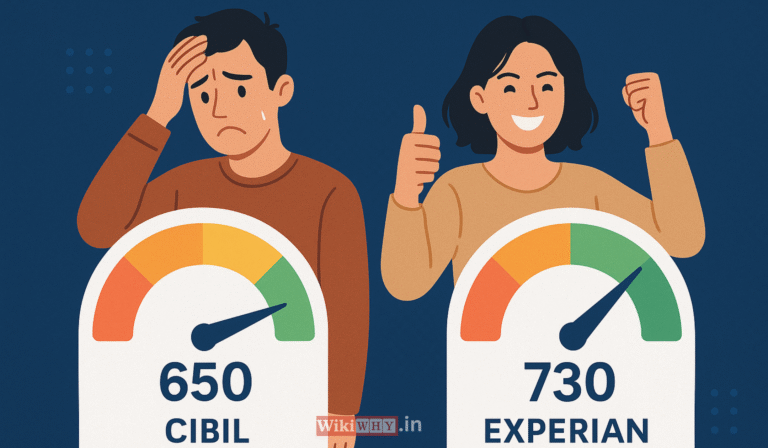CIBIL and Experian are two of the most trusted credit bureaus in India. Their main role is to collect and store information about your financial activities. This includes details such as how much money you borrow, the type of loans or credit cards you use, and how regularly you make your repayments.
Once they have this data, both bureaus analyze it carefully. Based on your borrowing and repayment behavior, they prepare a three-digit credit score. This score acts like a report card of your financial health.
If the score is given by CIBIL, it is called your CIBIL score. On the other hand, if it comes from Experian, it is known as your Experian score. Even though they come from different companies, both scores serve the same purpose. They help banks, lenders, and credit card providers decide whether you are a trustworthy borrower.
What Is a Credit Score and Why Should You Care About It?
A credit score is a 3-digit figure that reflects your creditworthiness. In other words, how reliable you are with borrowed funds. Lenders such as banks, NBFCs, and fintech companies use this figure to determine whether to lend you money and at what rate of interest.
In India, the score typically falls between 300 and 900.
In simple words, a higher score means you are seen as a responsible borrower. A lower score signals that you may have trouble repaying loans. That’s why keeping your credit score healthy is very important for your financial future.
But with a twist: there isn’t only one credit score. There are several credit bureaus like CIBIL and Experian generate their own scores based on individuals financial data they collect.
More about CIBIL and Experian credit bureaus
✅ CIBIL (Credit Information Bureau India Limited)
✅ CIBIL (Credit Information Bureau India Limited)
CIBIL, now officially called TransUnion CIBIL is India’s oldest and most widely used credit bureau. It was established back in the year 2000.
Today, almost every major bank and lender in India relies on its reports. In fact, over 90% of Indian lenders check CIBIL scores before making any loan-related decision.
The CIBIL score ranges between 300 and 900, where a score closer to 900 shows that you have a strong repayment history. Because of its long history and wide usage, CIBIL has become the most recognized credit score in India.
Official Website: https://www.cibil.com
✅ Experian India
Experian is a global credit bureau that entered the Indian market in 2010. Interestingly, it was the first company to receive a license under the Credit Information Companies (Regulation) Act (CICRA) in India. Unlike CIBIL, which is favored by traditional banks, Experian is very popular among new-age fintech companies and NBFCs.
Experian scores range between 300 and 850. Just like CIBIL, a higher Experian score shows good repayment behavior and improves your chances of getting approved for loans and credit cards.
Official Website: https://www.experian.in
Global Credit Bureau Market Share in 2025
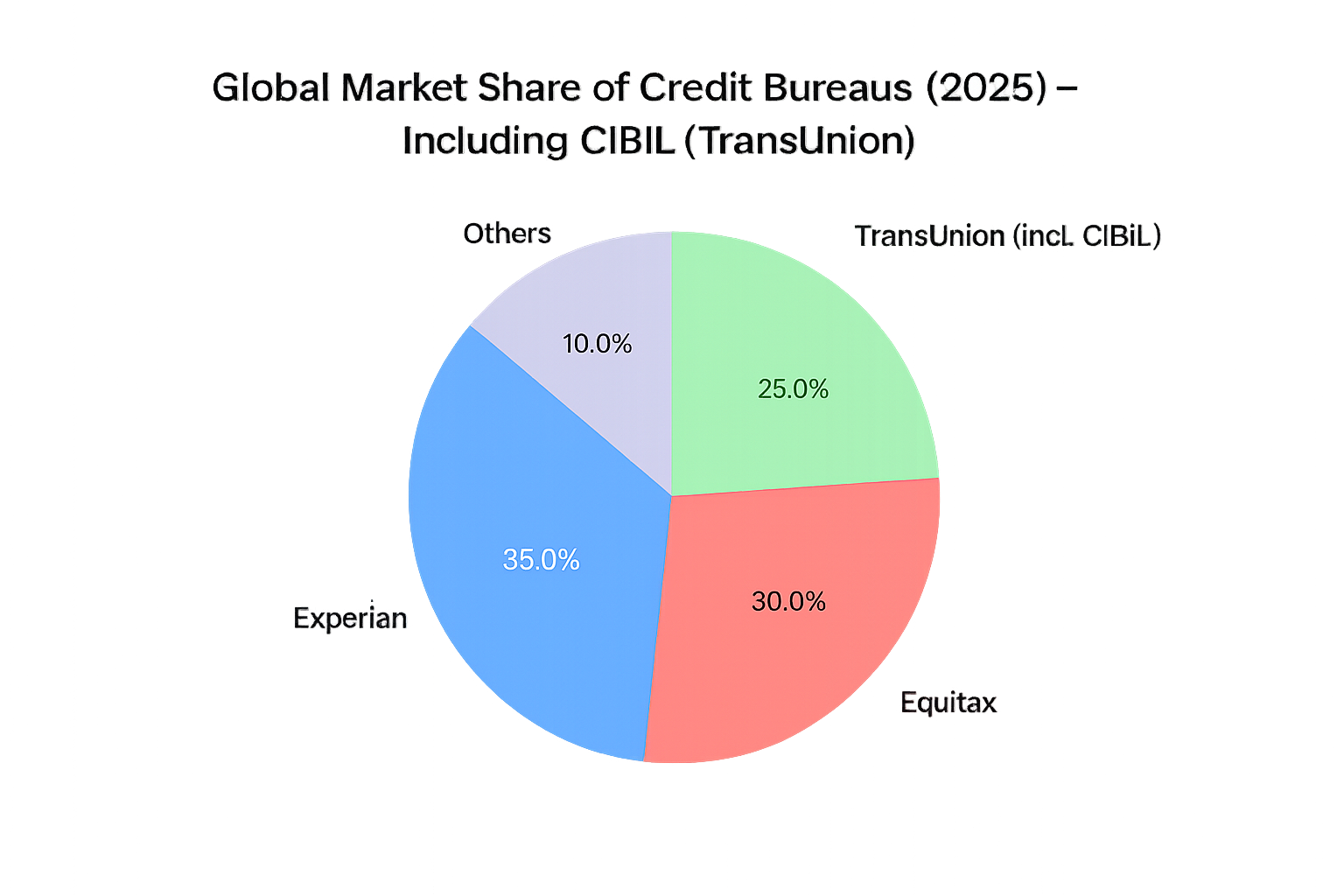
Figure: Experian leads with 35.0%, followed by Equifax at 30.0%, and TransUnion (including CIBIL) at 25.0%. These figures represent the projected global credit bureau market share for 2025.
Many times, you must have observed two different apps show two different credit scores. You’re not alone. Several Indians are confused when their CIBIL score and Experian score differ quite significantly.
One may report 730 while the other only crosses 650. That’s confusing, right?
In 2025, as online lending increases exponentially and more Indians rely on credit cards, buy-now-pay-later apps, and personal loans.
Therefore, knowing your credit score is more important than ever. More importantly, you need to know why Experian and CIBIL scores are different. This will prevent you from being rejected for credit, charged exorbitant interest rates, and even identity theft.
This in-depth article, explains why these differences occur, what each bureau does, what to do when your CIBIL score decreases or doesn’t show up at all, and why all this matters for your financial health.
Why Experian and CIBIL Score Differ
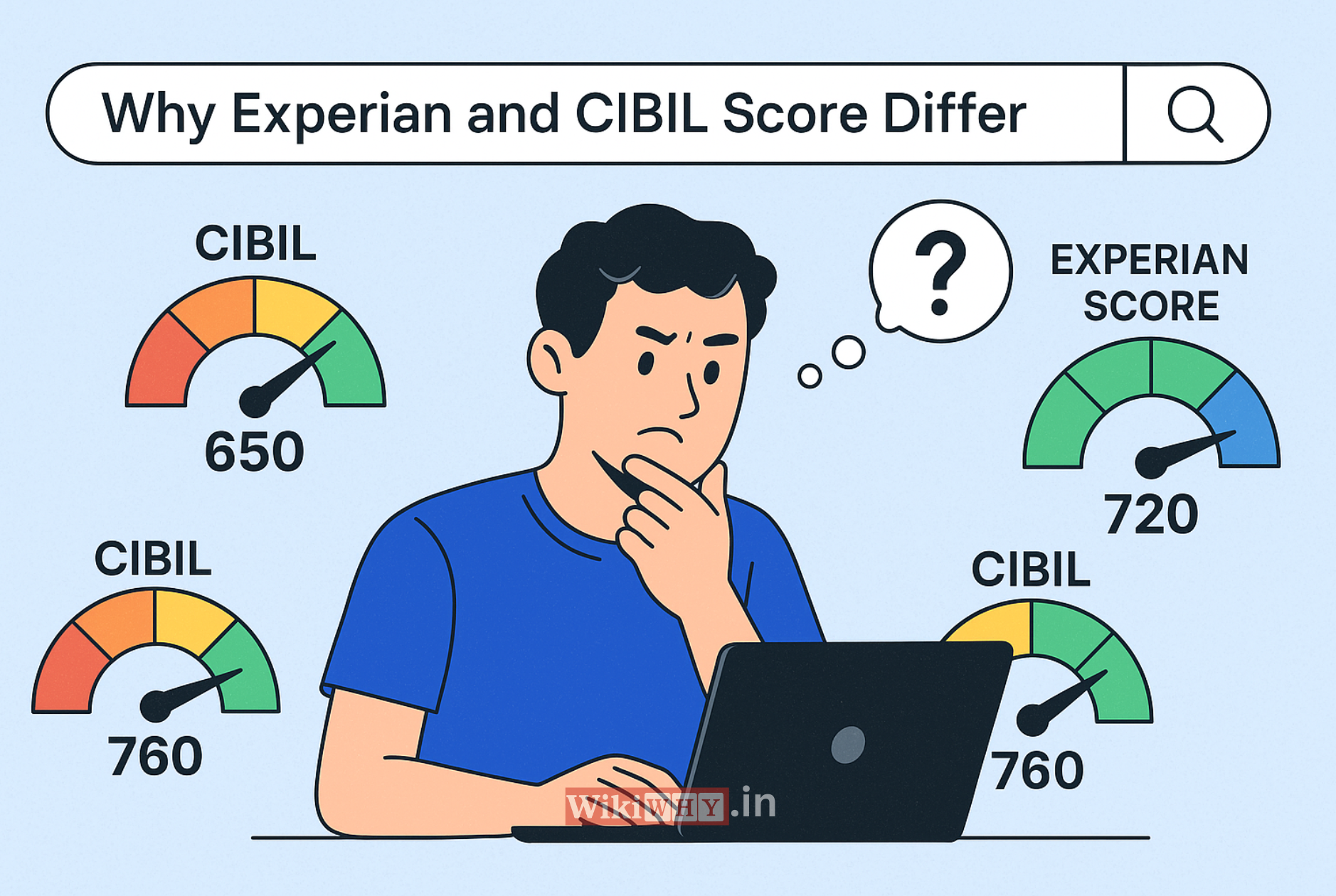
1. Different Scoring Algorithms
Both bureaus have their own proprietary formulae for calculating your score. Though they look at the same parameters such as repayment history, credit utilization, and age of accounts, each may place varying weights on these parameters.
For instance:
- CIBIL might place greater emphasis on your repayment history.
- Experian might place greater importance on credit utilization or composition of secured and unsecured loans.
2. Difference in Data Reporting by Lenders
Not everyone repays all credit bureaus. Some may report your loan information just to CIBIL but not to Experian, or the other way around.
This leaves you with incomplete credit history, and that hurts your score directly.
Suppose you closed a personal loan recently with a small NBFC that reports only with Experian. Your Experian score gets a boost, but your CIBIL score does not change.
3. Frequency of Data Updates
Each credit agency refreshes your report based on when they get information from banks. If Experian refreshes your profile on the 3rd of the month, and CIBIL refreshes on the 15th, your scores may vary dramatically in between.
4. Varying Credit Score Ranges
CIBIL uses a credit score range from 300 to 900, while Experian’s range goes from 300 to 850. The difference might seem small, but it can change how your score is interpreted — a 750 with CIBIL is excellent, but the same number carries even more weight in Experian’s slightly narrower scale.
5. Processing Lag in Time
At times, a single bureau posts your information faster than the other. If you settled a large loan last month, Experian might have already posted it while CIBIL is still to show the same.
Now, again, Experian is significant, but CIBIL is more important in India. Banks and lenders will first look at your CIBIL score to determine whether or not to approve or deny your loan.
That is why it is quite critical to learn about how your CIBIL score functions and what influences it.
Understand, how CIBIL fluctuates, why it decreases, and what can be done about it.
CIBIL Score Decreased? Here’s Why
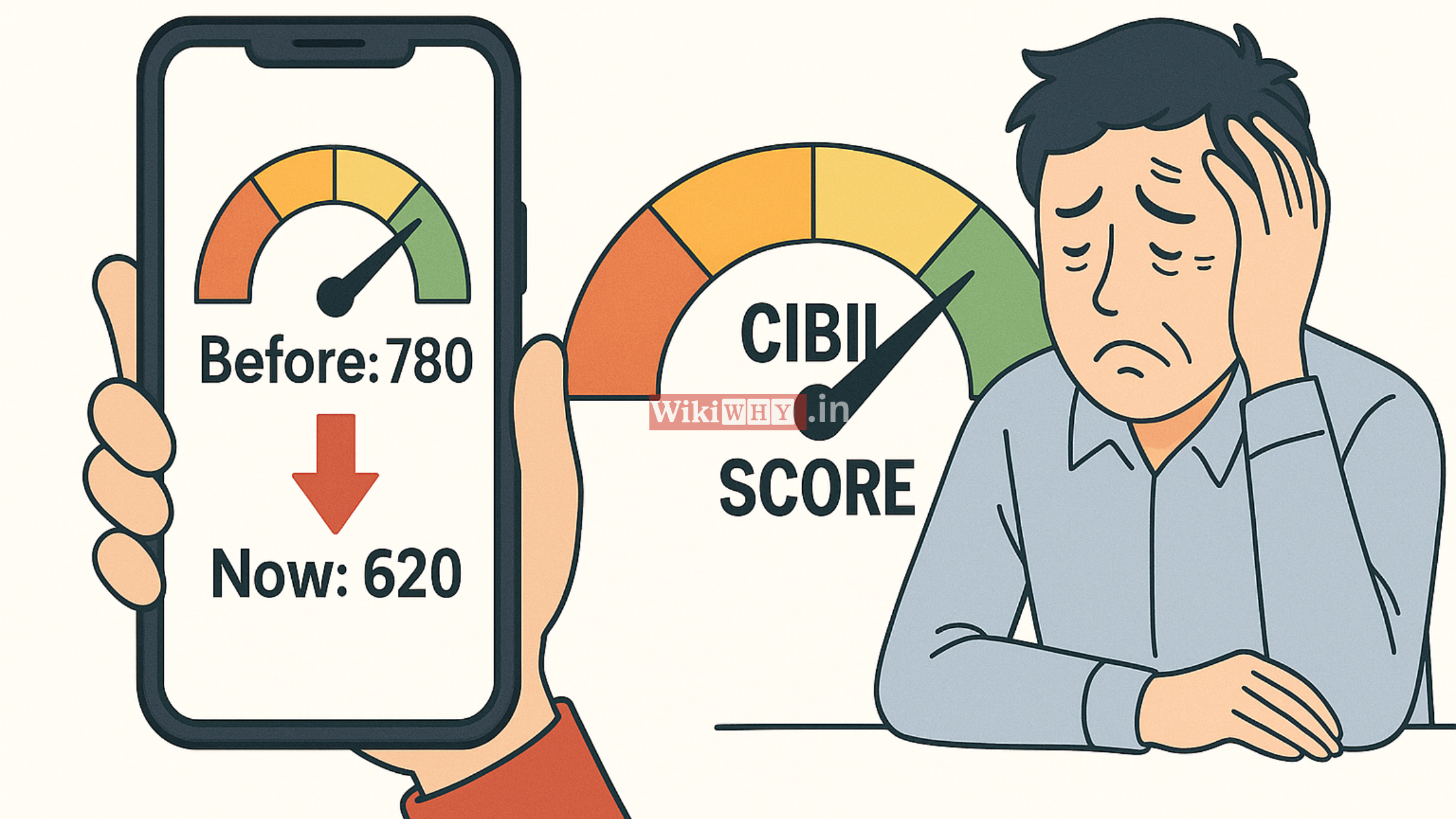
This is a common question from users, especially after taking new credit or spending using credit cards. Below are the causes for why your CIBIL score decreases suddenly:
1. Overdue or Delayed Payments
A single defaulted EMI can damage your score. CIBIL’s algorithm places a high value on your payment track.
2. High Credit Utilization Ratio
Are you going over 30–40% of your credit limit? That is a signal to credit bureaus.
Suppose your credit card limit is ₹1,00,000 and you spend ₹80,000 regularly. Your score can drop even if you pay on time.
3. Frequent Applications for Loans
If you have applied for too many loans or credit cards within a limited period of time, your score can drop due to repetitive hard pulls.
4. Closed Old Accounts
Surprisingly, closing an old credit card can hurt your score. Older accounts help maintain a longer credit history, which boosts your score.
5. Errors in Credit Report
Sometimes, incorrect reporting by lenders — such as showing unpaid dues you’ve already cleared — can pull down your CIBIL score.
💡 Tip: Always download your credit report from https://www.cibil.com and check for errors.
Why My CIBIL Score Is Not Showing?
Did you recently check your score and get a message like “No Credit History” or “Score Not Available”? Let me tell you why it happens.
✅ No Credit Footprint
If you’ve never taken out a loan or credit card, there isn’t any credit activity to learn from. So, no score is calculated.
✅ Very Recent Credit History
If you’ve just gotten your very first credit card or loan, CIBIL may not have enough information to calculate a score yet.
✅ Technical Errors or Mismatch in Data
Many times writing mistakes in your name, phone number, or PAN in your loan application may show wrong records of CIBIL score.
💡 Tip: Create a dispute directly with CIBIL on their online portal to correct mistakes.
Why Your CIBIL Score Is Important
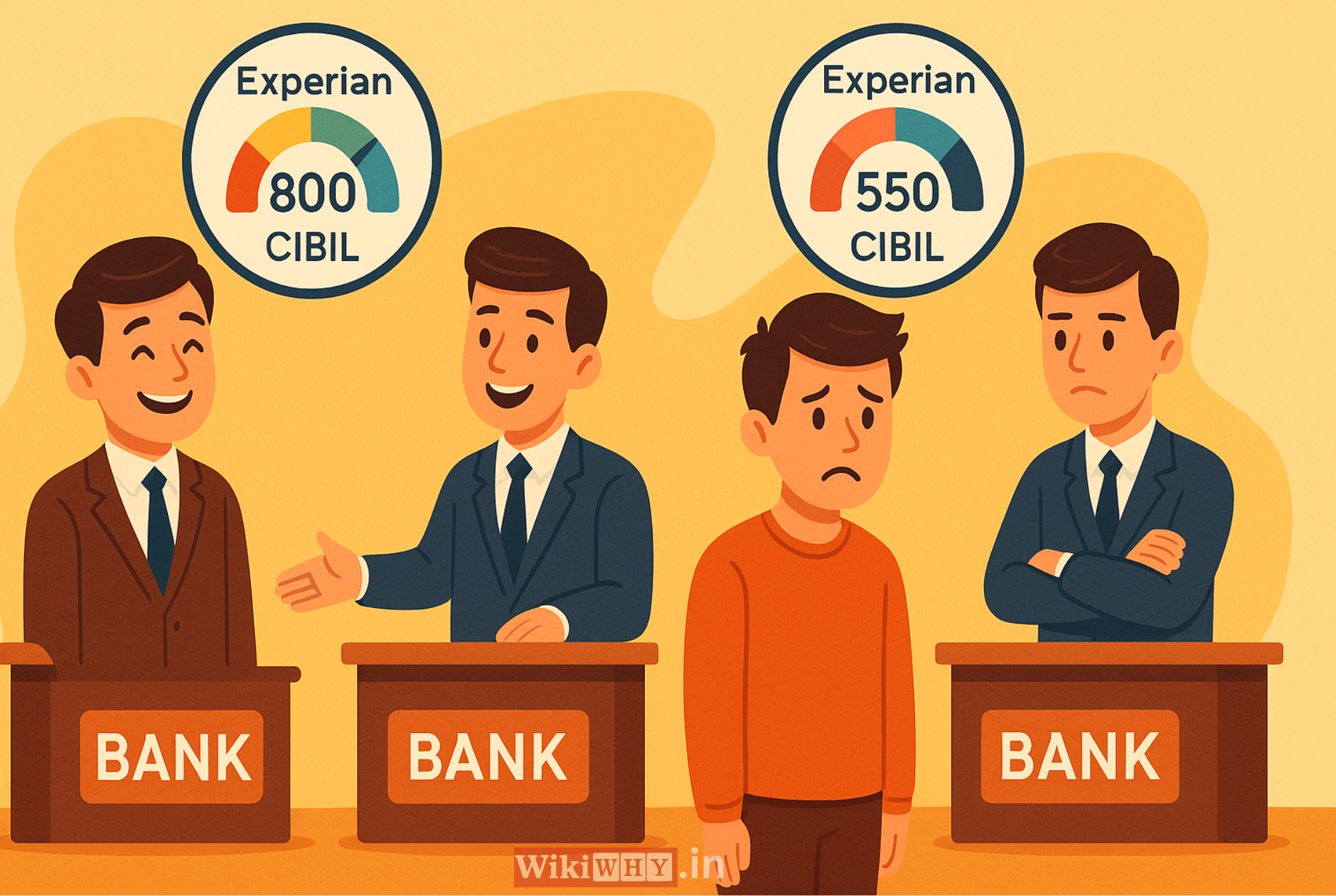
Let’s get to the point: Why is your CIBIL score so vital?
1. It Decides Loan Approval
Every major bank like SBI, HDFC, ICICI, and Axis first check your CIBIL score before they even consider your application.
Above 750 generally promises smooth approval and beneficial interest rates.
2. Affects Credit Card Limit and Eligibility
Improved the score, improved are the prospects of getting premium cards like HDFC Infinia or SBI Elite with greater cashback and rewards.
3. Helps in Getting Rent Agreements and Jobs
Most companies and landlords today check credit scores before finalizing rent or jobs — especially finance jobs.
4. Sets Your Financial Independence
Maintaining a high CIBIL score will allow you to negotiate better terms, lower EMIs, and even have your credit limit increased automatically.
RBI(Reserve Bank of India) data (2024) revealed that over 80% of personal loans approved in urban cities were for applicants with CIBIL scores above 740. Source: RBI Annual Report
If credit score is so important, you should also know how to maintain it at a high level.
Below are some simple but powerful ways to help you strengthen your score and keep it steady for the long run.
10 Simple Tips to Boost Your Credit Score Quickly in 2025
Building a good credit score is like maintaining your health. You cannot achieve it overnight, but with discipline, consistency, and smart habits, you can strengthen it step by step.
A higher credit score not only makes borrowing easier but also helps you secure loans at better interest rates. Let’s explore some practical ways to boost your credit score.
1. Pay Your EMIs and Credit Card Bills on Time:
The first and most important rule is simple: never miss a due date. Whether it is an EMI or a credit card bill, always pay on time. Even a single missed payment can stay on your report for years and pull your score down. Timely payments show lenders that you are dependable and capable of handling credit responsibly. Setting reminders, using auto-debit facilities, or scheduling payments in advance are easy ways to stay consistent.
2. Keep Your Credit Utilization Below 30%
Another golden rule is to watch how much of your available credit you actually use. Experts recommend keeping your credit utilization ratio under 30%. For example, if your card limit is ₹1,00,000, try not to spend more than ₹30,000 in a billing cycle. Spending close to the maximum limit makes you look financially stretched, even if you pay the bill in full. On the other hand, controlled usage builds a positive impression of your money management.
3. Avoid Too Many Loan or Credit Card Applications
Applying for several loans or credit cards in a short time may give lenders the impression that you are desperate for credit. Every application also triggers a hard inquiry, which temporarily reduces your score. Instead of applying everywhere, compare offers carefully and choose the one that truly fits your need. This approach will protect your score and show that you make thoughtful financial decisions.
4. Check Your Credit Report Regularly
Many people ignore this step, but reviewing your credit report is essential. Agencies like CIBIL, Experian, Equifax, and CRIF High Mark allow you to download one free report every year. Mistakes do happen—sometimes a loan you never took may appear under your name, or a payment you cleared might still be shown as pending. Identifying and disputing such errors immediately prevents them from dragging down your score unnecessarily.
5.Maintain a Healthy Mix of Credit
Lenders prefer borrowers who can manage different types of credit well. Having only credit cards or only personal loans may not be as impressive as having a balanced mix. A secured loan like a home loan or car loan, combined with an unsecured loan such as a personal loan or credit card, shows that you can handle both responsibly. This healthy combination strengthens your profile and boosts your creditworthiness.
6. Pay More Than the Minimum Due on Cards
If you pay only the minimum due amount on your credit card, the remaining balance keeps rolling over with interest. This not only increases your debt but also affects your score in the long run. Always try to clear the full bill or at least pay more than the minimum.
7. Keep Old Credit Accounts Active
The age of your credit history matters. Older accounts reflect long-term reliability. Do not close your old credit cards unless absolutely necessary, because they add positively to your score by showing how long you have been responsibly managing credit.
8. Avoid Co-signing Loans Without Care
When you co-sign a loan, you share the responsibility. If the other person defaults or delays payment, your credit score also suffers. Only co-sign if you fully trust the borrower and are prepared to step in if needed.
9. Reduce Outstanding Debts Whenever Possible
Paying off existing loans earlier than required, or at least reducing outstanding balances, improves your debt-to-income ratio. Lenders see you as less risky when you owe less, which directly benefits your score.
10. Be Patient and Consistent
Finally, remember that boosting your credit score is not a one-time action but a continuous process. Just like good habits shape your health, consistent financial discipline improves your score over time. Avoid shortcuts or tricks that promise instant results. Instead, focus on building a strong track record through steady, responsible behavior.
In short: Pay on time, use less than 30% of your credit limit, avoid unnecessary applications, check your reports, maintain a credit mix, pay more than the minimum due, keep old accounts, avoid risky co-signing, reduce debts, and stay consistent. These 10 steps will gradually increase your score and open doors to better financial opportunities.
Case Study from Real Life: How One Mistake Affected Both Scores Differently
- Name: Priya Mehta
- Occupation: Software Professional, Pune
Priya maintained a good credit history. In January 2024, she took a personal loan of ₹5 lakh under a fintech app. Her bank account, however, did not have enough money on the EMI date because the credit of salary was delayed.
This missed EMI was reflected in her report immediately through CIBIL, and the score came down from 782 to 706.
But with a twist here — the NBFC she had borrowed from reported to CIBIL and not to Experian. Her Experian score was 775 and it stayed at 775.
This caused a bit of confusion when applying for a car loan. One bank took her based on her Experian score, while another bank did not approve her because of her CIBIL dip.
So what’s the take away? Well – monitor both, and make sure all of your lenders report to both bureaus.
Here are Some Trustable Tools to Monitor Credit Score and Alerts?
Credit Score Monitoring Tools in 2025 (Free & Paid):
- OneScore
- CRED
- Bajaj Finserv Credit Pass
- Paytm & BankBazaar
These apps provide real-time alerts, detect fraud, and offer score-building tips.
Final Thoughts: Track, Understand Reason, and Improve
Being aware of how Experian and CIBIL scores differ is the first step towards being a creature of your own financial health. While both attempt to evaluate your creditworthiness, their methodology, source of data, and logic are different — that is why there is a disparity.
Rather than getting anxious, though, it is better to do the following:
- Keep an eye on both scores from time to time
- Report disputes for errors
- Build a positive credit report
Think of your credit score as your financial reputation. It’s one of the first things banks and fintech companies check before offering you any kind of loan or credit card.
In fact, without verifying your credit score — especially your CIBIL score — no lender in India will approve your application.
That’s just how the system works now. So, take your credit score seriously. A strong score can help you get faster approvals, better interest rates, and fewer financial headaches down the road.
Frequently Asked Questions(FAQ’s)
Q1. What is a Credit Score?
A credit score is a three-digit number that shows your creditworthiness based on your financial history.
Q2. Which is better: CIBIL or Experian?
Both are reliable, but CIBIL is the most widely used in India, while Experian is also recognized by many banks and NBFCs.
Q3. Why does my CIBIL score differ from Experian?
Scores differ because each bureau collects data from different banks and may use slightly different algorithms.
Q4. Why did my CIBIL score suddenly drop?
Late payments, high credit utilization, loan defaults, or multiple credit applications can cause a sudden drop.
Q5. Why is my CIBIL score missing?
It may be missing if you are new to credit, or if your bank hasn’t reported your data to CIBIL yet.
Q6. How important is a CIBIL score?
Very important — lenders use it to decide whether to approve loans and credit cards, and at what interest rates.
Q7. How can I monitor my credit score?
You can track your score using trusted tools like CIBIL’s official site, Experian, or government-approved apps.
Q8. Can you share a real-life case study of CIBIL score impact?
Yes. For example, a person with a low score of 590 was denied multiple loans, but after improving repayment habits, their score rose to 730, and they got quick approvals.
Q9. What are the most common FAQs about CIBIL?
Questions about missing scores, sudden drops, score differences, and how to improve are the most common.
Q10. What are the final thoughts on maintaining a good credit score?
Pay bills on time, keep credit utilization below 30%, and check your credit report regularly for errors.

